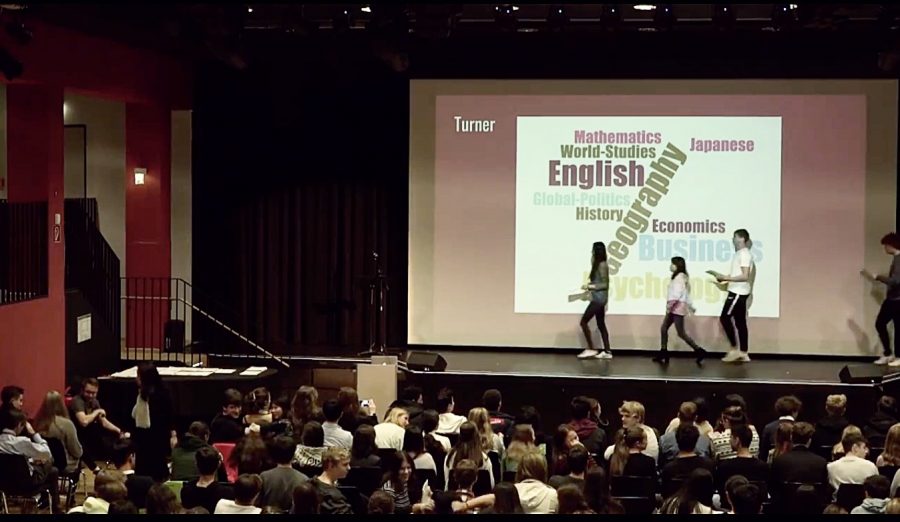Experiencing the Extended Essay: Senior Stories
Class of 2020 at the EE ceremony on November 5th 2019
After months of research and writing, the Class of 2020 has finally finished their Extended Essays (EE), a 4,000-word independent research paper. They presented their hard-work during the EE ceremony on November 5th, where they handed in their essays in and presented their topics to the class of 2021. It was a finale of the lengthy process that the grade had gone through.
A number of students were willing to take part in an interview in order to elaborate on their experiences and offer some advice for future seniors to come.
Andrew, a senior who had written a history EE on World War I, presented his encounter with this momentous assignment. He had decided on the topic of World War I since it seemed to have a lot of sources and information
Andrew had been determined not to repeat the previous mistake he had made in his history IA, where he had struggled due to the lack of resources that accompanied his research question. However, he had not been exempt from the struggles of the EE, “I had a tough time finding bigger primary sources for my EE.”, he stated, “Luckily it was easy to prove my argument because it was pretty straightforward.”
When asked about his management of deadlines, Andrew explained his process swiftly“I did most of it the week before the draft was due. I felt like I had a lot of time but it was because I had a flexible schedule that week. But I think you should start in the summer so that you have a good place to start and you’re not too stressed. Overall, I’d advise future seniors to pick a topic that you know you can do well before going in to write it. It will be much easier to write it and you will know what you want to say beforehand.”
Another senior, Paul wrote his EE in physics on the effect of temperature of binary stars on its orbit path. He had already known that he was going to write his EE in physics as he greatly enjoyed the subject. “I chose my topic after looking through the textbook. Then I just went with binary stars, because they seemed to be interesting. I had a talk with my supervisor and we solidified our topic. A bunch of revisions later it was perfect.”
Paul explained that for him the hardest part of his EE was the experiment itself, “Getting all the equipment and research together was the hardest part. The easiest part was certain parts of the write-up.” However, he advised future students planning to do their EE in a group 4 (Science) to finish the experiment for the EE (if you’re planning on doing it in a science) before the summer break, so you could finish the write-up over the summer. “Pace yourself! This sounds really dumb, but you should make a plan for when to work on which part and do your best to stick to it”.
Additionally, he warned students to not get weighed down by procrastination, as that was one difficulty he struggled to overcome. “I got the experiment done pretty quickly, but I couldn’t be bothered to do the write-up for a while,” he said, “I played video games and just did everything aside from the write-up because it seemed like such a big task. But two days before the summer break ended I thought ‘Hmmm maybe I should get something done’ and so I forced myself to get all the write-up done in a relatively short amount of time before school.”
Claire talked about her experience writing an EE in English Language and Literature. Her EE focused on Aristotle’s modes of persuasion in three different political speeches. When asked why she chose this topic, she enthusiastically responded “I wanted to do something that would give me the opportunity to further research American politics specifically the US 2016 elections, so during my research, I started examing some of the speeches by candidates. I combined this with my knowledge/passion for debate and began looking at the use of Aristotle’s modes of persuasion in the speech”.
The most difficult process that she encountered was examining the rhetoric devices used in the speeches. However, she found the structure and the actual writing of the essay easier than she had expected since she had done thorough research and a detailed outline beforehand.
For Group 1 (Language A) EEs, Claire advised that it is before the summer that it is the best time to start working on it, conducting research, and creating a preliminary outline. Then everything would be wrapped up into the first draft which should be completed during summer break.
When asked about her summer break, Claire responded, “Finding time in the summer was very difficult between travels and I found myself procrastinating over the break a lot. But I overcame this by just doing little things step-by-step to make it more manageable and less intimidating. Break up your EE into more manageable parts so it’s less intimidating and take it to step by step and make sure you start as early as you can.
One advice that was given by all three seniors was that the most important part of the process was, of course, communicating with your assigned supervisor. This is important to remember, as students should not feel like they are struggling through these months alone, but that they have their supervisor right by their side. I hope that this article has shed some light on how the seniors’ tackled their respective questions and shown future seniors that this process, however arduous, is still something that we can all power through.








